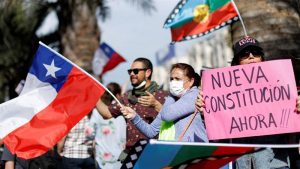By: Amber Couzo, 2L

(A demonstrator holds a placard reading :New Constitution now” during a protest against Chile’s government in Santiago, Chile. Source: Jorge Silva/Reuters
Chile has been facing a state of unrest in recent weeks, as tens of thousands of civilians took to the streets in protest. A protest that first started about hikes in subway fares exemplifies Chileans demand for a new constitution. On November 10, 2019, the Chilean government finally gave into protestors’ central demand and agreed to write a new constitution to replace the current one created under Augusto Pinochet’s military dictatorship.
The current Political Constitution of the Republic of Chile was ratified by a controversial vote in 1980 under Pinochet’s dictatorial rule. Although the Constitution has been modified since the 1980s, Chileans agree that a major upheaval of the text is necessary due to its dictatorial influences. The Constitution’s biggest critics argue that the document lacks legitimacy because the authoritarian enclaves do not allow the functioning of an actual democracy. The document establishes high-quorum provisions and applies supra-majoritarian mechanisms that do not allow fundamental changes to be made without the acceptance of the country’s political leader.
A look at the historical evolution of the Constitution since 1980 shows that changes brought about a Chilean Supreme Court, criminal justice reform, direct elections of municipal councilors, and efforts toward gender equality. Amendments made in 2005, which included changing presidential term limits to four years, reducing military influence in politics, and removing the electoral system, became the closest steps toward a democratic constitution in Chile. Nevertheless, these amendments have not quashed the majoritarian Congressional approval needed to incite political changes. Chileans continue to complain that citizens cannot actively participate in the political decisions that affect them most like access to healthcare, water rights, and pensions.
Before President Sebastián Piñera’s agreement to rewrite the Constitution on Sunday, former President Michelle Bachelet made such attempts in 2018. President Bachelet sent a plan to Congress that sought to strip the Constitution of any traces of authoritarianism and create town-hall groups to discuss how to effectively create a new constitution. Her plans have been sitting at the committee-stage in Congress since their creation. During the recent weeks of protests, civilians adopted a similar plan to Bachelet’s, holding their own community town hall meetings called cabildos where they gather and discuss the possibility of a constitutional convention and the needed reforms.
President Piñera’s proposal to rewrite the Chilean Constitution is proof that active political participation and even civil unrest can be catalysts for change. Although no plans have been officially released by the Chilean government, Interior Minister Gonzalo Blumel said that the president and other government officials agreed that Congress should lead the rewriting process—a decision that may not sit well with citizens who want a greater participatory role in the political process. Blumel added, “above all, we must focus on the goal of reconfiguring the social contract, which has arisen as a fundamental demand of our citizens.”




